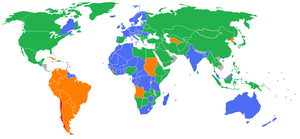"Critics of the phrase Oscar bait might tell you that making movies is already too difficult to do well without adding the pressure of having an awards-worthy product," concedes VanAiresdale.[1] He nevertheless defended use of the term. "The takeaway from Weinstein and the rest shouldn't be that Oscar bait is a reductive concept that's bad for movies," he wrote. "Rather, bad movies are bad for movies." Since the race for awards did generate some good movies, he felt, moviegoers should not be so dismissive. "Oscar bait is the only reason that grown-ups have anything at all to watch in a movie theater anymore, with four months of awards season compensating for the other eight months of craven superhero franchises, anemic romantic comedies, and whatever Adam Sandler wipes off his shoe."[1]
The fact that the concept existed and had a name showed how important film still was to American culture, VanAirsdale said.
Other critics have complained about the effect on the yearly release calendar, by which grouping most prospective Oscar winners in the last months of the year, usually in limited release, along with holiday season tentpole movies results in January and February becoming the winter dump months, when new releases are generally low in quality and/or limited in their appeal. A similar period, from mid-August through September, also precedes the end of the year.[52]
"This clustering of quality films in the post–Toronto Film Festival weeks of fall and winter frustrates critics, publicists, movie exhibitors, studios, and award voters," Adam Sternbergh wrote in a 2015 Vulture post. "[B]ut, most crucially, it alienates the movie audience." At the time that year's nominations were announced, he observed, it was expected that either Boyhood or Selma would win, yet the latter film had not yet gone into wide release, and another top contender, American Sniper, only went into wide release the day after nominations were announced. "Of all the side effects of this silly awards-show pileup, this one seems like the silliest: People are expected to care about the awards prospects of films they won't get to see until long after the awards are awarded."[53]
While acknowledging the dump months are a result of other factors besides the Oscars and beyond the studios' control, such as the weather, the economy and competition from other entertainment such as (especially) football season, Paul Shirey at JoBlo.com nevertheless calls on Hollywood to spread out its Oscar-quality releases throughout the year:
Sternbergh suggests this could be facilitated by emulating the playoff formats of professional sports leagues, which divide their teams into conferences to ensure wide interest in postseason elimination contests. The Academy, he proposes, should return to five nominations for Best Picture and picking one nominee from each three-month quarter of the year, with the best second-place finisher getting the remaining wild card berth.[53]
In popular culture[edit]
In the British comedy series Extras, actress Kate Winslet plays a caricature of herself desperate for an Oscar. During the episode, Winslet tells the character Andy Millman (portrayed by Ricky Gervais) that she took the role in the unnamed Holocaust film, claiming that films such as Schindler's List and The Pianist have "Oscars coming out of the arse".[54] Later in the episode, Winslet also muses that "playing a mental" also guarantees an Oscar win.[55] Winslet would later win her first Academy Award, Best Actress, for her role as an illiterate former Nazi in The Reader (2008).[56][57]
In the film Tropic Thunder (2008), characters Tugg Speedman (Ben Stiller) and Kirk Lazarus (Robert Downey Jr.) discuss the concept regarding Speedman's former role in the fictional film Simple Jack, in which Lazarus notes that "you never go full retard", contrasting the Oscar successes of Dustin Hoffman (Rain Man, 1988) and Tom Hanks (Forrest Gump, 1994) with Sean Penn's failure to win an award for his role in I Am Sam (2001). Tropic Thunder received protests from disability rights organisations due to its constant use of the word "retard"; Stiller defended the scene as being intended to lampoon actors who use such subjects as a way to win awards.[58]
During the week before the 2017 Academy Awards telecast, NBC talk show host Seth Meyers ran a parody trailer for Oscar Bait, "a film that is shamelessly timed for awards season" on his show. It featured clips of Meyers and others involved with his show as actors crying frequently, with scenes featuring racial tension and latent homosexuality along with "pretentiously artistic shots of a man's hand grazing wheat". Intertitles quoted purported reviews from real publications, such as "If you like films where a character is forced to overcome a rare disease, then this, my friends, is your film" and comparing the parody film favorably with The King's Speech.[59]
You received this message because you are subscribed to the Google Groups "1top-oldtattoo-2" group.
To unsubscribe from this group and stop receiving emails from it, send an email to 1top-oldtattoo-2+unsubscribe@googlegroups.com.
To view this discussion on the web visit https://groups.google.com/d/msgid/1top-oldtattoo-2/CAHT588_A_5x1LBM27qAX3fb92y7LPU6P-zeZn-5q%2BjMVbzcp%2Bg%40mail.gmail.com.


